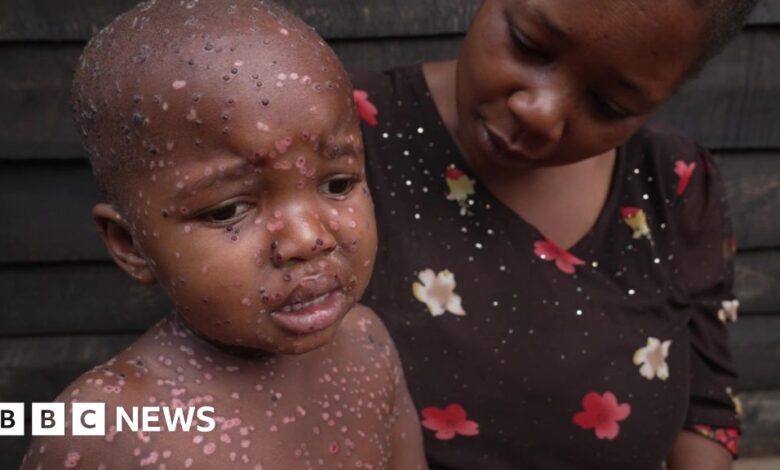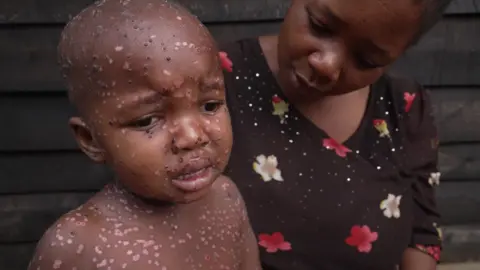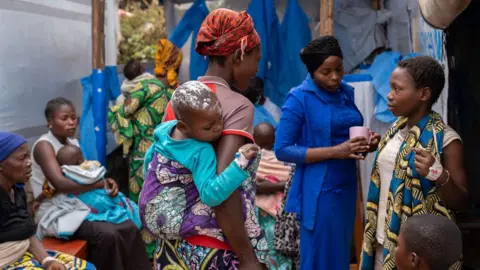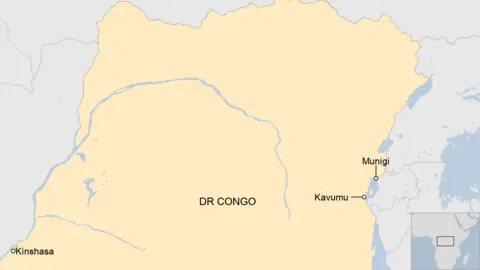Children are suffering the most

 Glory Murhabazi
Glory MurhabaziAs the World Health Organization declares mpox a public health emergency of international concern due to its rapid spread, all eyes are on the Democratic Republic of Congo, which accounts for nearly all of the cases recorded this year and more than 450 deaths.
During visits to treatment centres in the east of the country, the BBC found children were worst affected by the disease, which can be fatal.

“It started as a small inflamed spot. The mother squeezed it and a thin discharge came out. Then another spot developed, and after a short time they spread all over the body,” Alain Matabaro recounted, describing how mpox developed in his six-year-old son Amani.
He began to recover after four days of treatment at a clinic in Munigi, near the major city of Goma in eastern Congo.
According to Dr Pierre-Olivier Ngadjole, who works for the charity Medair, about 75% of the cases seen by doctors are children under 10 years old.
Young people appear to be particularly severely affected by mpox outbreaks because their immune systems are not yet fully developed.
Dr Ngadjole also blamed overcrowding at a nearby refugee camp for people forced to flee their homes due to conflict in the region. One way mpox spreads is through very close contact and children “are always playing together. They don’t really care about social distancing,” he told the BBC.
“You can also see in households, they even sleep in the same bed. You can see three, four, five children. This transmission happens every day.”
Since June, the Munigi clinic, which provides free treatment including antibiotics for skin infections, paracetamol and safe drinking water, has treated 310 cases of mpox. It is now seeing between five and 10 new admissions every day.
No one has died from the disease there and Dr Ngadjole believes that is because people sought help early.
“I think it is very important to provide free health care, especially in this context… [It] It means people don’t face any financial barriers, they come to the health facility early.”
But it was a different story, 80km (50 miles) southwest of Munigi, on the other side of Lake Kivu, at a hospital in Kavumu.
Eight hundred patients have been here since June and eight of them have died – all under the age of five.
 Glory Murhabazi
Glory MurhabaziAnsima Kanigo, two, caught mpox from one of her four siblings, all of whom have the disease.
Her mother, Nzigire Kanigo, 35, had no idea what it was at first.
“This is the first time I have seen this. When my child was sick, other parents told me that my child might have measles, but we started treating measles but it was not successful, so we decided to come here.
“God bless the doctor who brought the medicine… Ba [children] cured – they have gone home. I have only two people who are in this hospital with me. I thank God.”
The hospital’s medical director, Dr. Robert Musole, said authorities should not underestimate the outbreak.
“The situation is really dire and we are overwhelmed because our capacity is small but the demand is huge.
“The first challenge we faced in this response was accommodation for patients. The second challenge was the availability of medicines, which we did not have.”
Across eastern DR Congo, there are several refugee camps for millions of people who have been forced to flee their homes as various rebel groups operate in the area.
People often cram into makeshift structures and live in squalid conditions without good sanitation – ideal conditions for mpox to thrive.
Health workers have visited places like Mudja camp near Mount Nyiragongo to educate people on what to do if they develop symptoms, such as limiting contact with others.
“This disease makes us very scared that we will all get sick,” said Josephine Sirangunza, who lives in the camp with her five children.
She said the government needs to provide some basic equipment to help prevent the spread of the disease.
“When we see someone sick, we worry about how to protect ourselves.”
This is also the view shared by Bosco Sebuke, 52, who has 10 children.
“We have been raised awareness [about mpox]but we are very scared because we are crowded in our shelters. We sleep in very bad conditions, we share beds, so prevention is very difficult and so we are scared,” he said.
The outbreak in eastern Democratic Republic of Congo is caused by a new mpox strain called Clade 1b and has now spread to neighboring countries.
Last week, the Congolese government said it hoped vaccines would soon arrive from the United States and Japan. Until then, the country remains without a vaccine despite being at the epicenter of the virus.
Mr Matabaro, Amani’s father, who is currently recovering from mpox, said he was hopeful that a vaccine could be available soon.
But distribution will be extremely limited and, as Dr. Ngadjole said, vaccination is only one aspect of reducing the spread of the virus.
“The [easiest] The action to take is to improve sanitation. When we improve sanitation at the household level, when we improve sanitation at the community level, it is very easy to reduce the risk of transmission.”
Ms Sirangunza agreed with the doctor’s thoughts: “Ask our leaders to send us medicines, soap and other protective measures so that we do not get infected.”

 Getty Images/BBC
Getty Images/BBC




